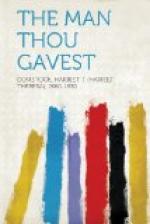At six o’clock Truedale went downstairs, but the house was empty. Lynda had gone, taking all sense of home with her. He did not wait to see what the dinner hour might bring about; he could not trust himself just then. Indeed—having blasted every familiar landmark—he was utterly and hopelessly lost. He couldn’t imagine how he was ever to find his way back to Lynda, and yet they would have to meet—have to consider.
Lynda, after leaving her workshop, had only one desire—she wanted Betty more than she wanted anything else. She put on her hat and coat and started headlong for her brother’s apartment farther uptown. She felt she must get there before Brace arrived and lay her trouble before the astoundingly clear, unfaltering mind and heart of the little woman who, so short a time ago, had come into their lives. But after a few blocks, Lynda’s steps halted. If this were just her own trouble—but what trouble is just one’s own?—she need not hesitate; but how could she reveal what was deepest and most unfailing in her soul to any living person—even to Betty of the unhesitating vision?
Presently Lynda retraced her steps. The calm autumn night soothed and protected her. She looked up at the stars and thought of the old words: “Why so hot, little man, why so hot?” Why, indeed? And then in the still dimness—for she had turned into the side streets—she let Truedale come into her thoughts to the exclusion, for the moment, of her own bitter wrong. She looked back at his strange, lonely boyhood with so little in it that could cause him to view justly his uncle’s last deed. She remembered his pride and struggle—his reserve and almost abnormal sensitiveness. Then—the experience in the mountain! How terribly deep that had sunk into Truedale’s life; how unable he had been to see in it any wrong but his own. Lynda had always honoured him for that. It had made it possible for her to trust him absolutely. She had respected his fine position and had never blurred it by showing him how she, as a woman, could see the erring on the woman’s part. No, she had left Nella-Rose to him as his high-minded chivalry had preserved her—she had dared do all that because she felt so secure in the love and sincerity of the present.
“And now—what?”
The bitterness was past. The shock had left her a bit weak and helpless but she no longer thought of the human need of Betty. She went home and sat down before the fire in the library and waited for light. At ten o’clock she came to a conclusion. Truedale must decide this thing for himself! It was, after all, his great opportunity. She could not, with honour and self-respect, throw herself upon him and so complicate the misunderstanding. If her life with him since June had not convinced him of her simple love and faith—her words, now, could not. He must seek her—must realize everything. And in this decision Lynda left herself so stranded and desolate that she looked up with wet eyes and saw—William Truedale’s empty chair! A great longing for her old friend rose in her breast—a longing that not even death had taken from her. The clock struck the half-hour and Lynda got up and with no faltering went toward the bedroom door behind which the old man had started forth on his journey to find peace.




